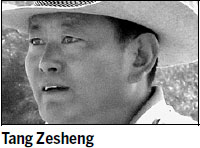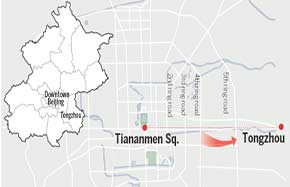Tibet's club coach hoping for a return of good old days
From being goalkeeper of the Tibet men's soccer team to the coach of the autonomous region's only soccer club, Tang Zesheng has witnessed the ups and downs of the sport's development in the region.
Tang, who is coach of Lhasa Pureland Football Club, said the regional soccer team had a period of success in the 1980s when it twice won an invitational tournament consisting of six teams from the six autonomous regions or prefectures nationwide.
"Those were the good old days," Tang said of the era, adding that the team, which consisted of both Han Chinese and Tibetan players, also took part in an international invitational tournament in Kathmandu, capital of Nepal, where they finished as runners-up.
Tang, who is half-Chinese and half-Tibetan, said the inclusion of Han Chinese players was an important factor in the team's success at that time.
However, since the China Football Association began allowing enterprises to purchase and manage soccer clubs in the 1990s, the decline of Tibetan soccer has been all too evident.

The region's soccer team, which was sponsored by the regional sport department, was disbanded in 1995.
Tang said the lack of soccer players and the region's poor soccer infrastructure also accounted for the decline of the sport.
"We were training in inland provincial areas, because there wasn't a standard soccer pitch in Lhasa. There was little grass, and the balls were easily punctured," he recalled.
"We had a severe shortage of talent, so when players got injured, we had no backup. Thus, we were forced to disband the team," he said.
The region's poor economic status at that time was the major reason for the sport's decline. "Families could not even afford to buy a pair of soccer boots for their children," he said.
Tang, who retired in 1987, later became a goalkeeping coach with the region's youth soccer team.
He then took a training course at Beijing Sports University and later became coach of the regional sports school's soccer team.
In the early 2000s, Tang became coach of Huitong Luhua Football Club, Tibet's first professional soccer club.
The club, which was playing in China League Two, the nations third tier, was forced to play "home" games in Beijing, as the China Football Association deemed the high altitude in Lhasa, capital of Tibet, unfit for association soccer.
The club went bankrupt in 2007, and Tang waited for more than eight years before landing a coaching job at Pureland.
"Now we have 20 players, including school teachers, soldiers and civil servants. Sometimes, we cannot field 11 players, and we have to find other people to play for us, as long as they have not previously featured for other teams," he said.
The players, from counties or districts across Lhasa, are aged between 20 and 38, he said.
He said soccer talent in Tibet is growing, but there is still not a professional team in the region.
"In the past, we had a small soccer-playing population, but a good team. Now, it is the exact opposite," he said, adding more investment is needed.
xuwei@chinadaily.com.cn
(China Daily 12/07/2016 page5)

























